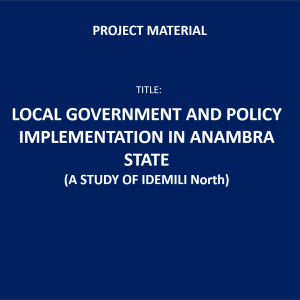No products in the cart.
Political Corruption and Grassroots Development in Nigeria
₦10,150.00
The general purpose of this study is to examine the effects of political corruption on grass root development. Other specific purposes include the following:
1. To find out the relationship between political corruption and grass root development.
2. To examine how inadequate finance posed serious challenge to grass root development in Anambra State.
3. To investigate the challenges facing grass root development in Anambra State.
4. To x-ray the strategies put in place to curb the menace of political corruption as well as increase grass root development in Anambra State.
Background To The Study
Nigeria being a country that is richly blessed with both natural and human resources is still battling to meet up with other nations of the world that are developed.
The primary reason for such stagnation socially and economically hinges on corruption. It is thus, an undisputed fact that corruption has been the log on the wheel of Nigeria development. It has ravaged the country and destroyed most of what is cherished as national values. It is however, very unfortunate that the political class shouldering the responsibility of directing the affairs of the country are the major culprit in perpetrating this act.
Truly, it’s a paradox that Nigeria, the World 8th largest exporter of crude oil, a country endowed with many resources, still has more than 70% of its population being below the poverty level as a result of corruption and economic mismanagement.
Nigeria is still grappling with the dilemma of corruption that has largely retarded socio development especially at the grass root level. Undermined economic growth, discouraged foreign investments and reduced the resources available for infrastructural development, public service and poverty reduction programmes. Much more disturbing, the scourge of corruption leaves the poor perpetually inappropriately under privileged, even as it endorse the development of democracy and the building of a society of opportunity more problematic their intended use corruption can be said to be the single most important factor responsible for the failure of governance and lack of sustainable socio economic cum grass root development in Nigeria.
Political corruption in Nigeria is as old as the history of the country itself (Aluko, 2009). Omotola traces corruption to colonialism. He argues that by all standards, colonialism in Nigeria were built on corruption. This is to the extent that because of the colonialist’s corrupt disposition to exploit the state for their exclusive benefit, they liquidated social structure against corruption associated with pre-colonial Africa and replaced or transformed them to their own purposes (Omotola, 2006:217).
The colonial era was characterized by the allegation of corrupt practices against civil servants and police officers (Aluko, 2009). This colonial legacy of political corruption was carried into independence period. Chinua Achebe, the famous Nigeria novelist, has highlighted the incidence of political corruption in some of his novels, (Achebe, 1960, 1966, 1988). Achebe’s literacy presentation of corruption indicates the extent and damaging impact of the phenomenon on Nigeria and her people. In Nigeria as indicated above, the incidence of political corruption is quite high since the return to democratic rule in the country in 1999, the country has either been ranked first or second in global corruption rating by Transparency International 2017.
Political corruption has demonstrated itself in Nigeria in various ways. According to the political bureau establishment in Nigeria in 1987, the manifestation which include: the inflation of government contracts, in return for kick back frauds and falsification of accounts in the public service; examination malpractices in our educational institutions; the taking of bribes and perversion of justice among the police, the judiciary and other organs for administering justice; and various heinous crimes against the state in the business and industrial sectors of our economy, in collusion with multinational companies such as over invoicing of goods; foreign exchange swindling hoarding, and smuggling.
Grass root development in Anambra State constitutes a fundamental problem. Over the years, development of local dwellers has been neglected. Rural development is the process of improving the life and economic wellbeing of the people living in rural areas. Grass root development has traditionally centered on the exploitation of land-intensive natural resources such as agriculture and forestry.
In Anambra State, rural development has taken a multi-sectional approach in the New Millennium Development Goals (MDGs) by 2015 as stipulated by the United Nations. According to the Ministry of Economic Planning and Budget hand bill (2011), ‘Anambra state is among the sub-national governments in Africa that adopted the MDGs.’ The strategy to achieving this, is through a unique approach christened Anambra Integrated Development Strategy (ANIDS), with which all targets of the MDGs are being pursued simultaneously.
According to Coleridge (1999: 19), the MDGs are:
1. Eradicate extreme poverty and hunger
2. Achieving universal primary education
3. Promote gender equality and empower women
4. Reduce child mortality
5. Improve maternal health
6. Combat HIV/AIDS, malaria and other diseases
7. Ensure environmental sustainability
8. Develop a global partnership for development
These developmental goals are not fully achieved due to the nature of political corruption in Anambra State and Aguata local government in Particular. These impediment range from interference by the higher levels of government i.e. Federal and State governments, bribery and corruption, embezzlement and gross inadequacy of well-trained and qualified personnel.
This study therefore, is an investigation of the perceived political corruption and how it has affected grass root development in Anambra State using Aguata local government area as a study area.
- ₦10,150.00

